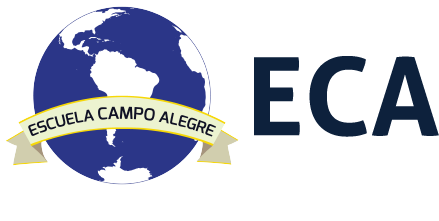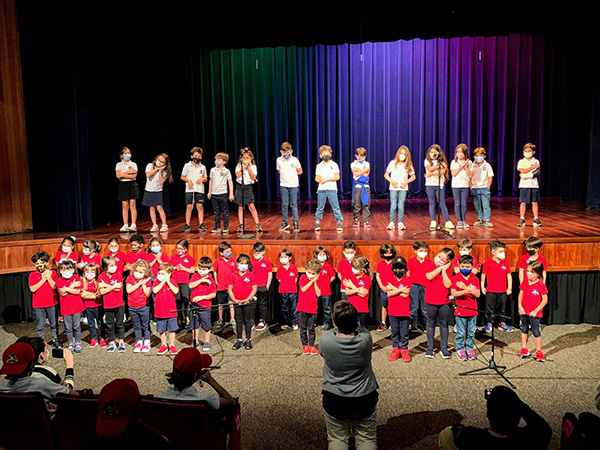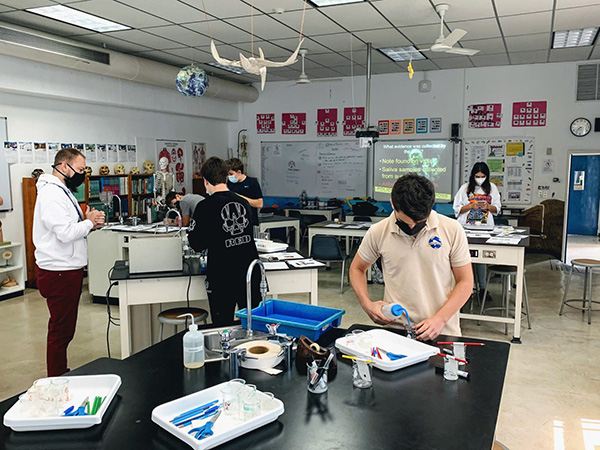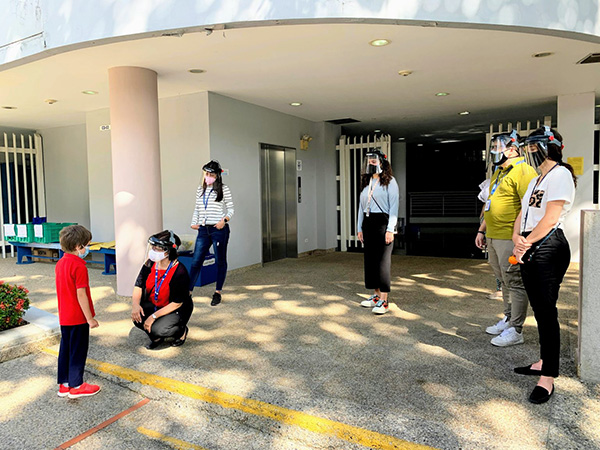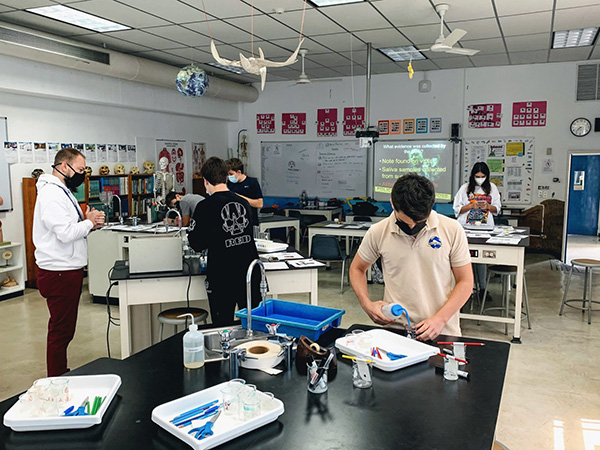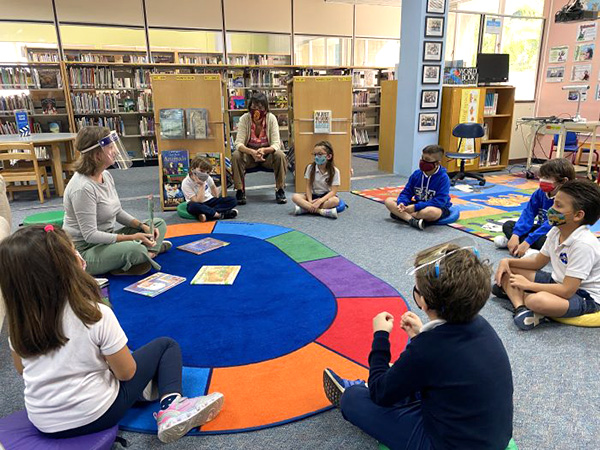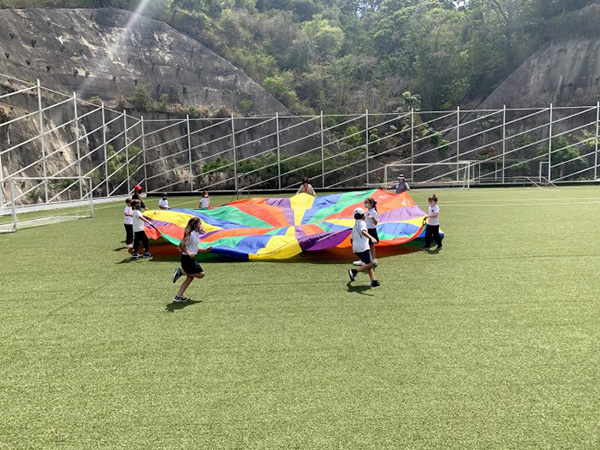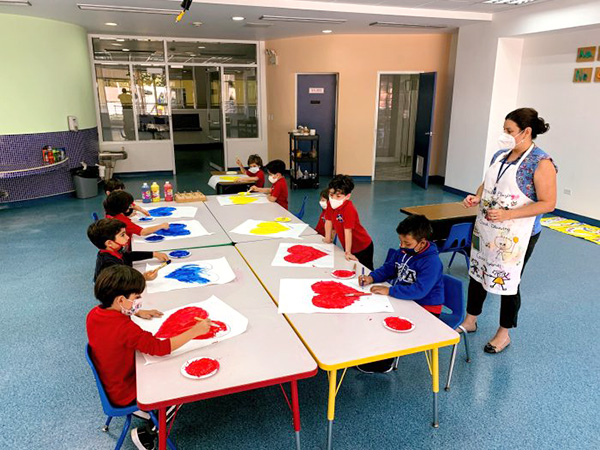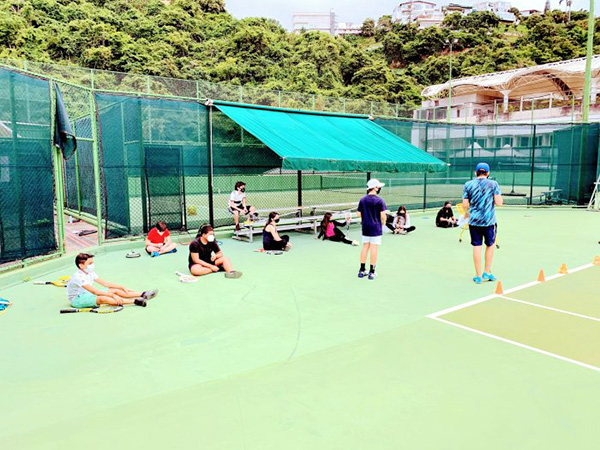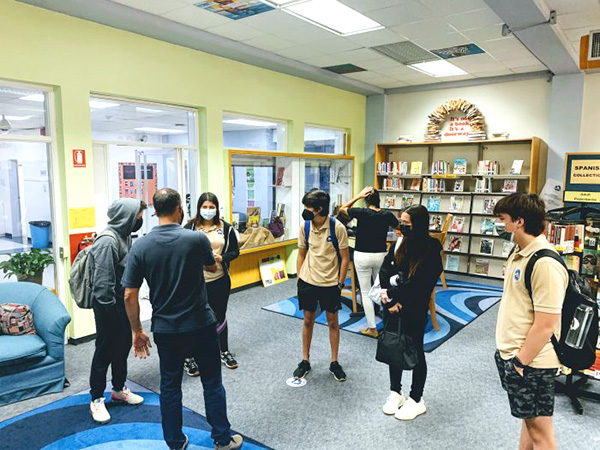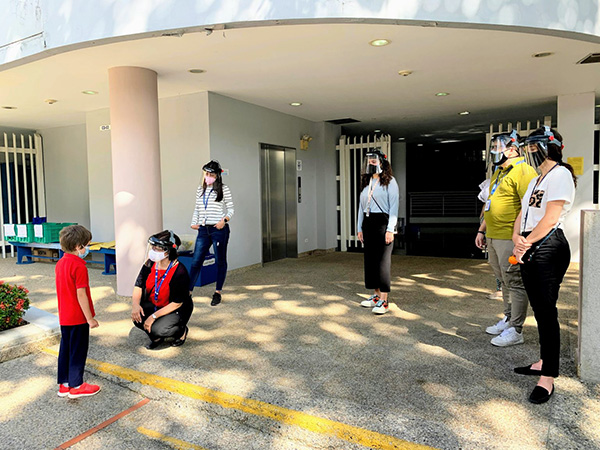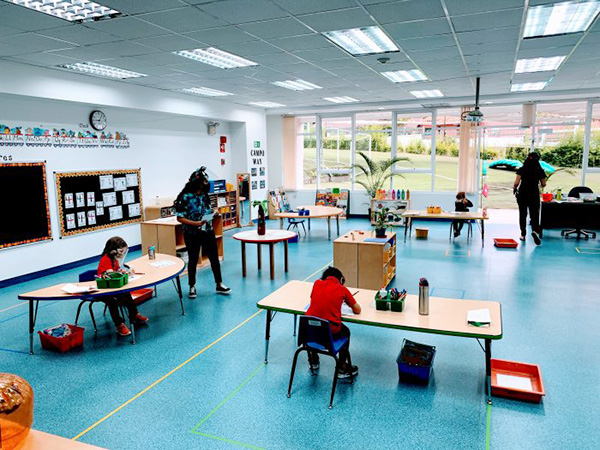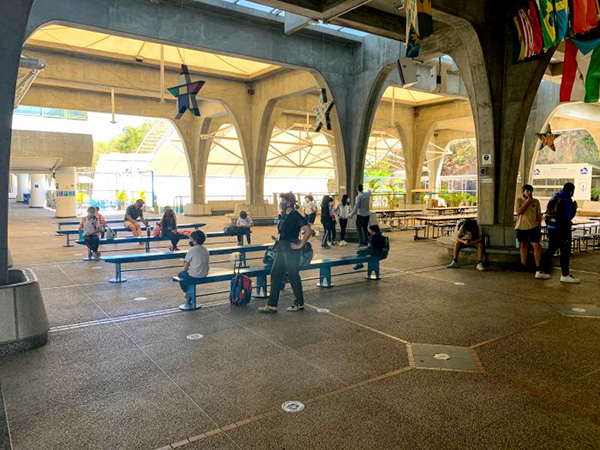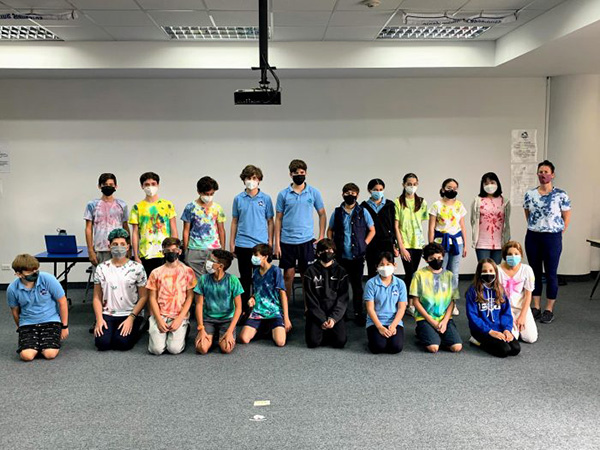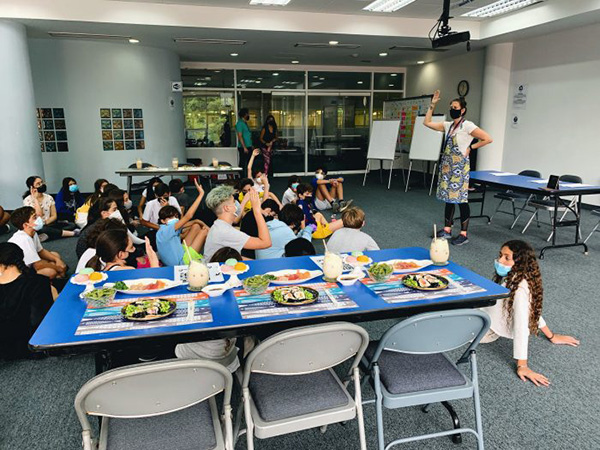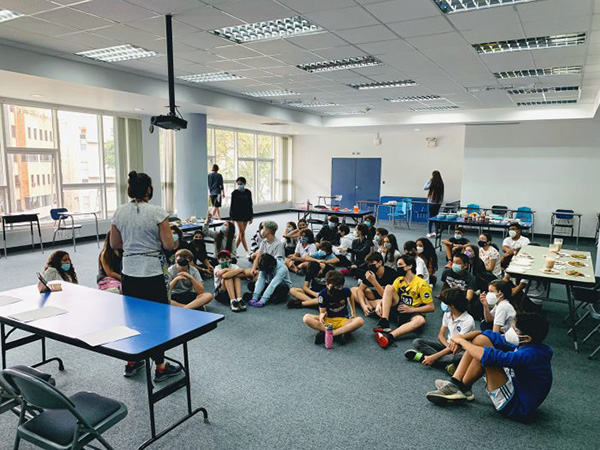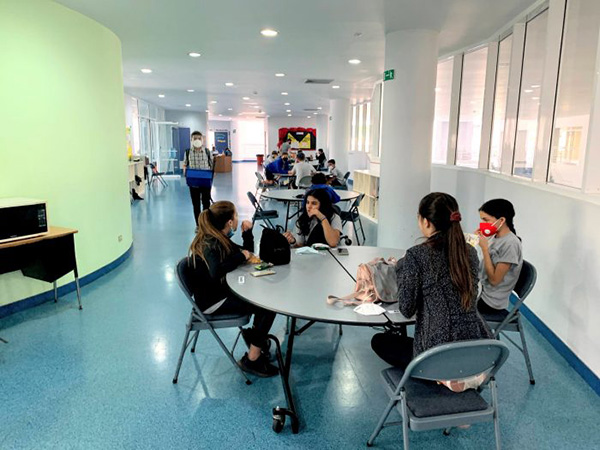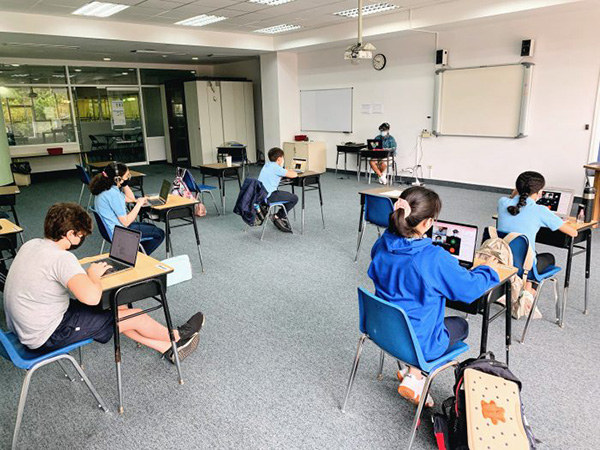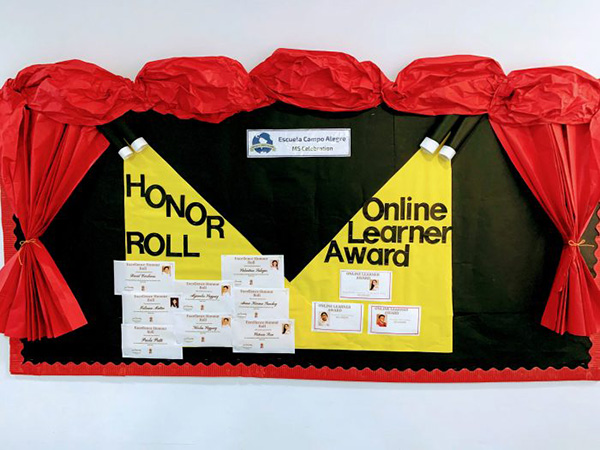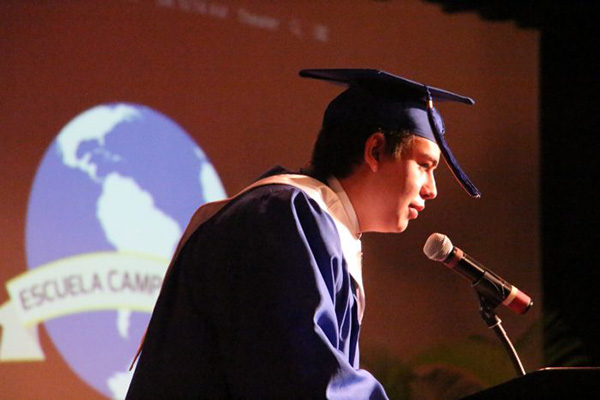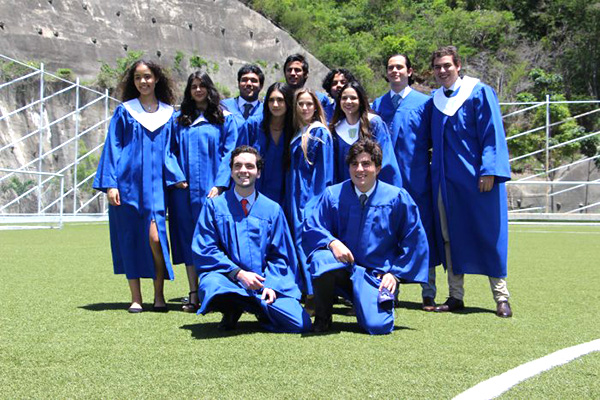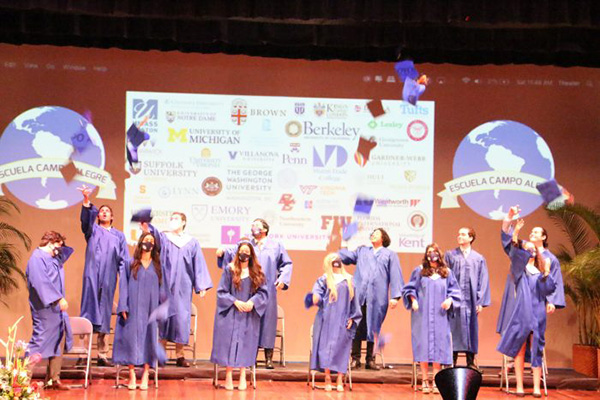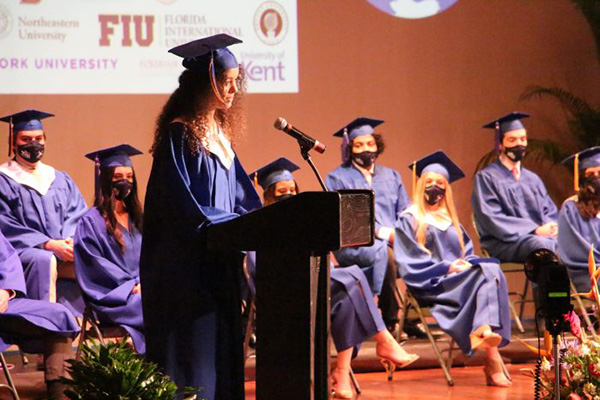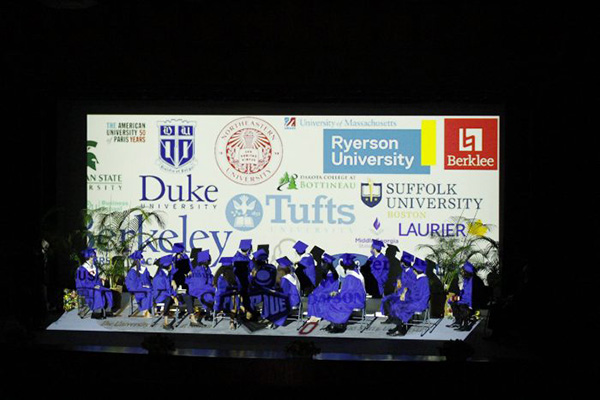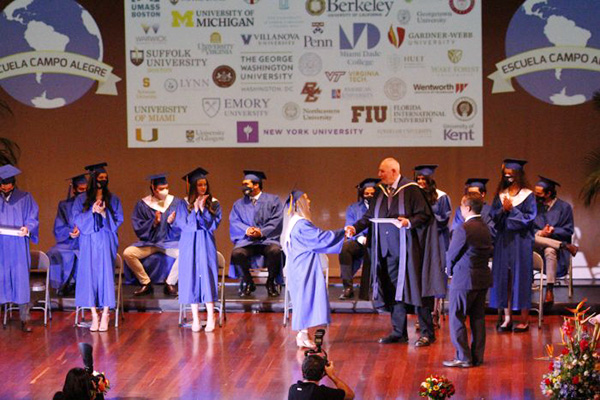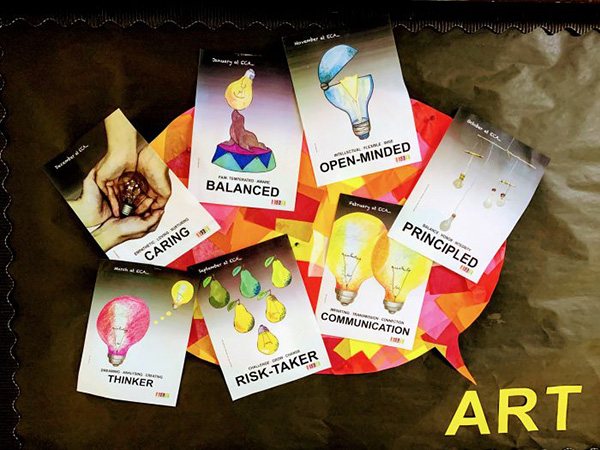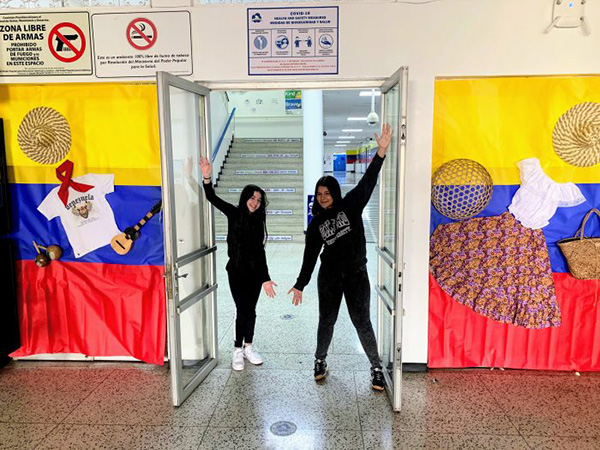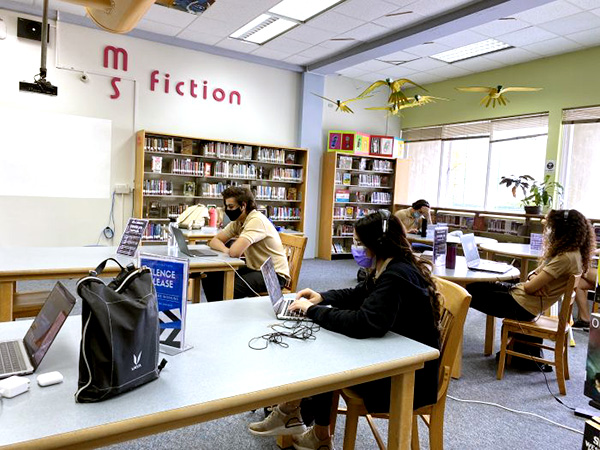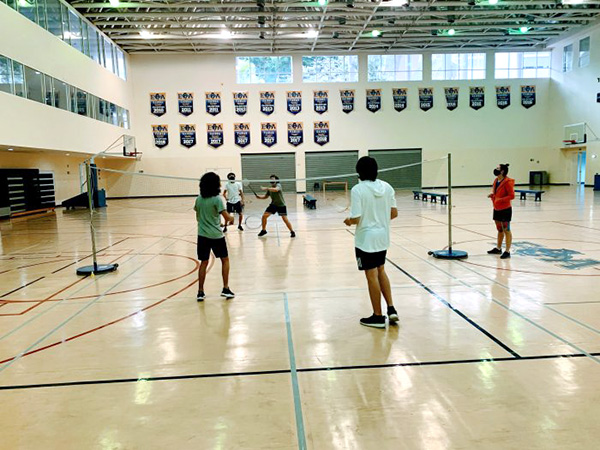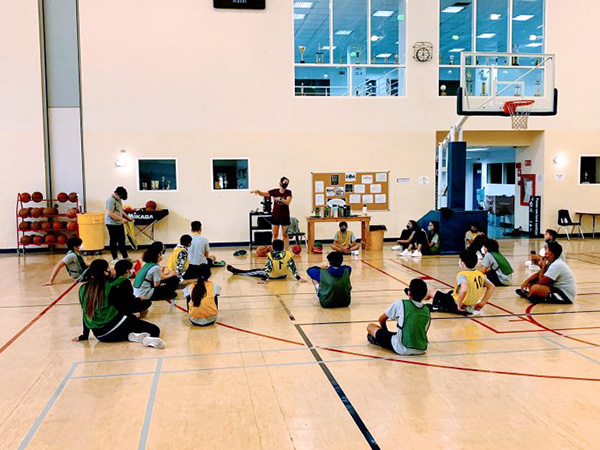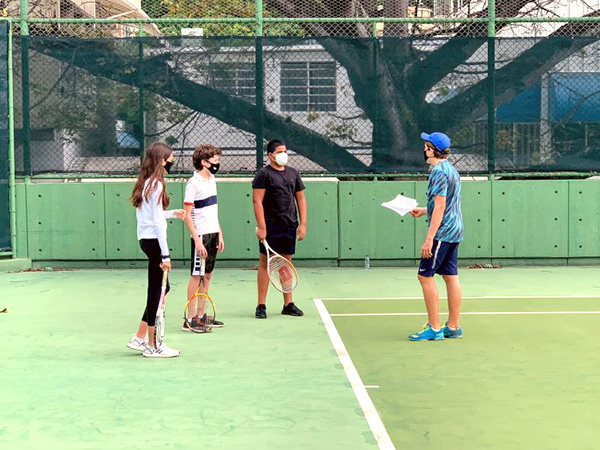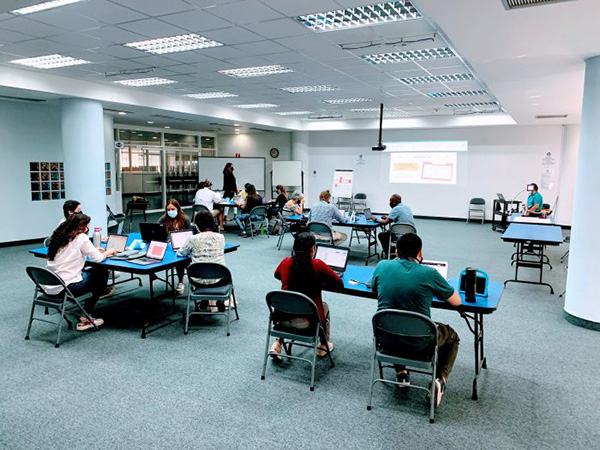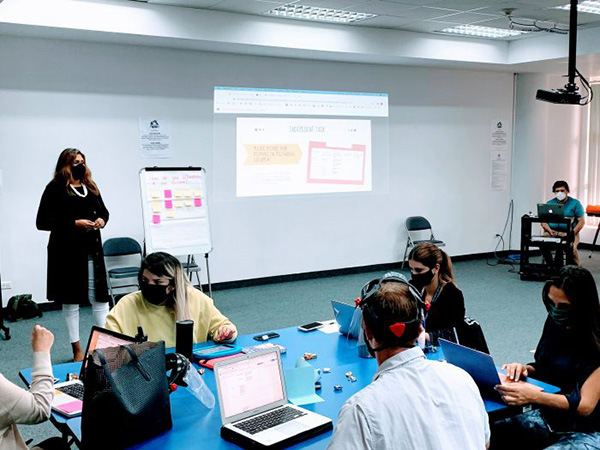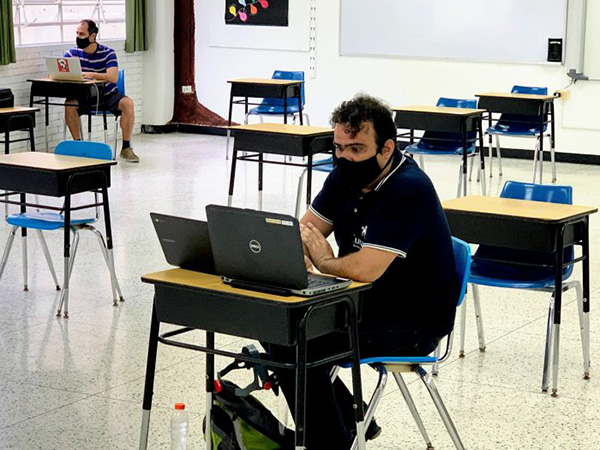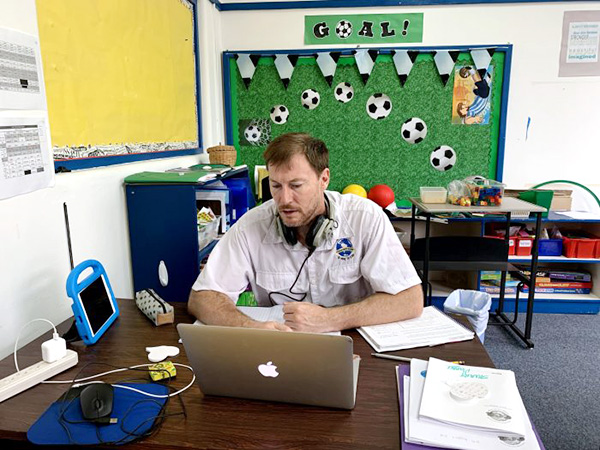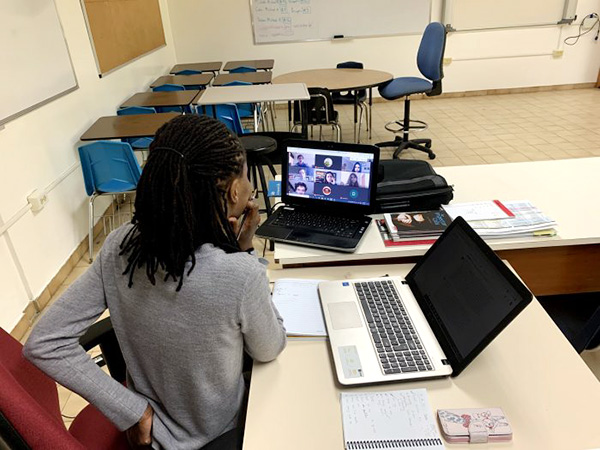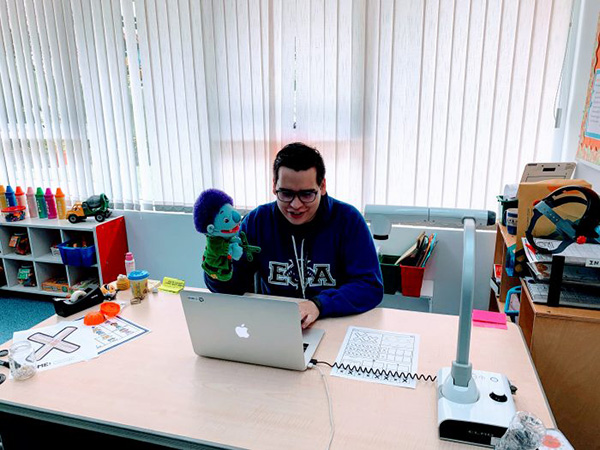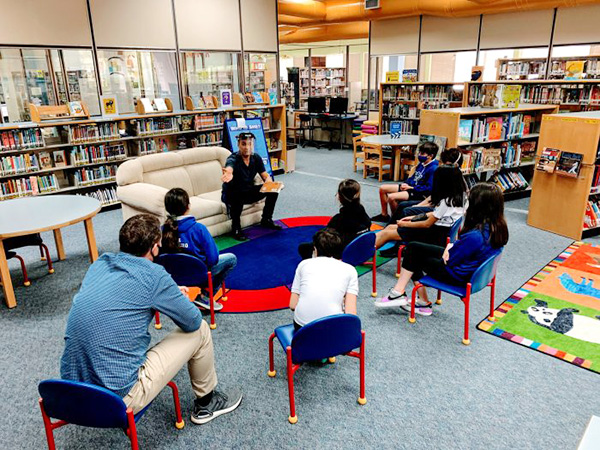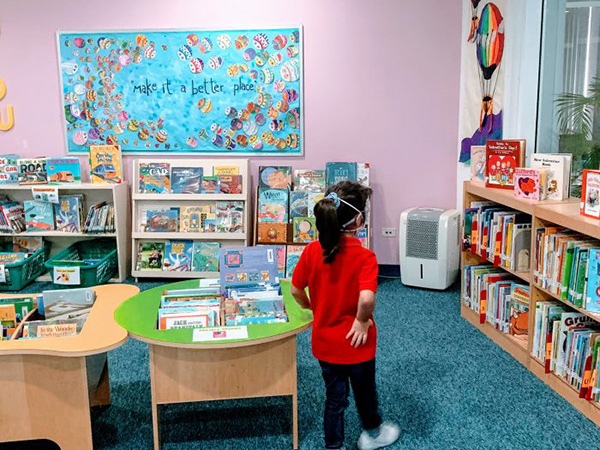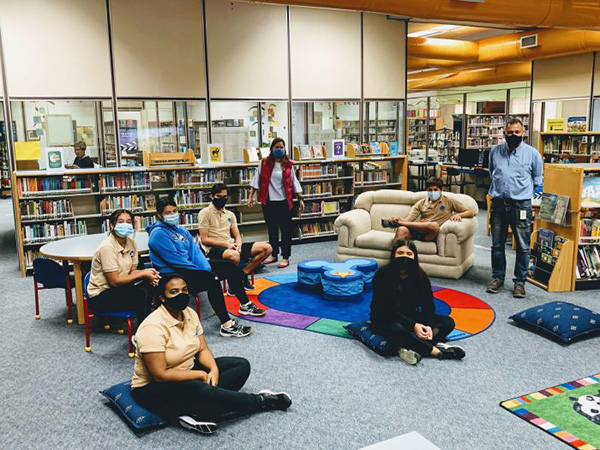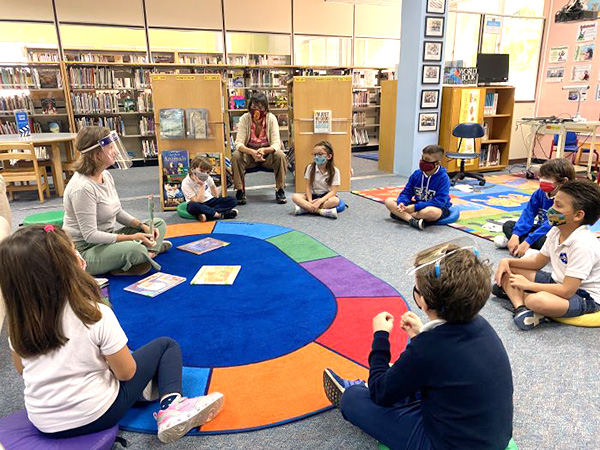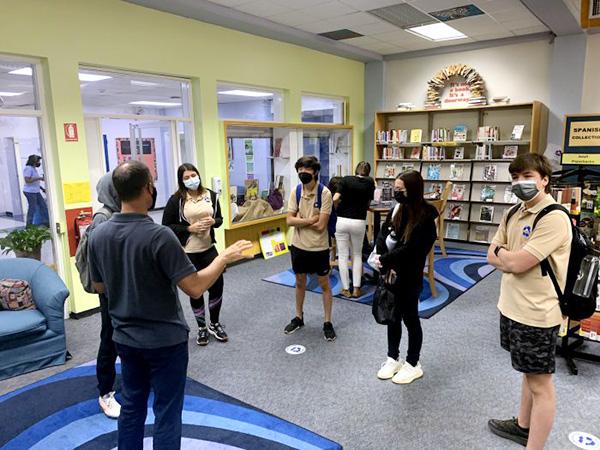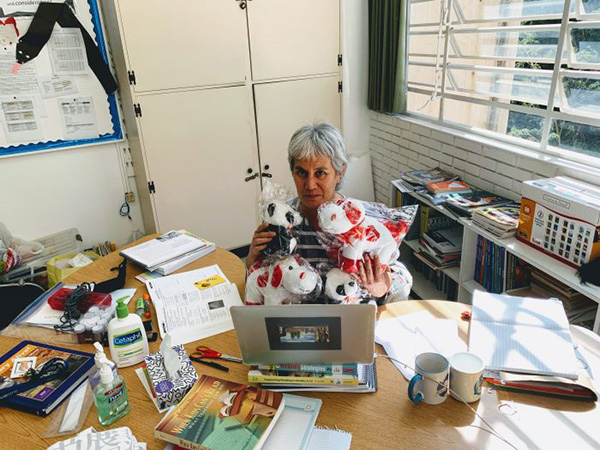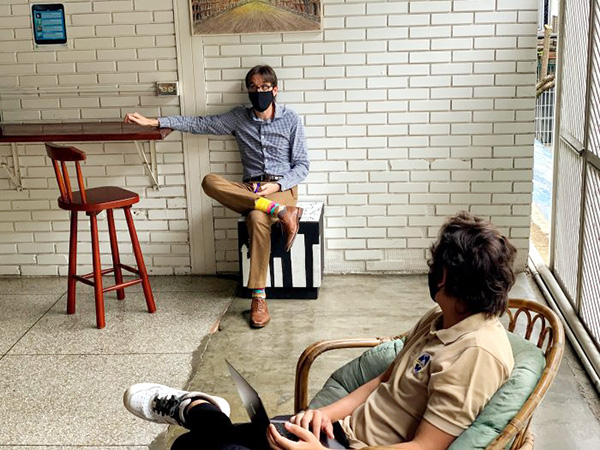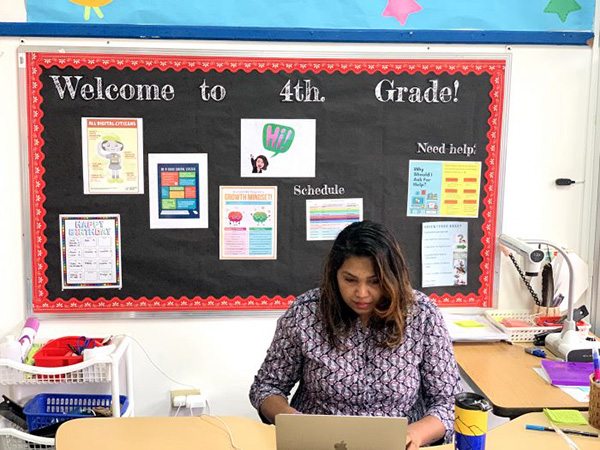ECA ANNUAL REPORT 2020-2021
Table of Contents
- Mission, Vision, and Guiding Statements
- Superintendent’s Annual Summary Report
- ECA Goals for 2021-2022
- MSA/CIS Annual Report
- ECA Goals for 2021-2022
- Elementary Principal’s Report
- Middle School Dean’s Report
- High School Dean’s Report
- Secondary School Counselor’s Report
- Secondary School Counsellor’s University Report
- Athletic/Sports Statement
- Curriculum and Professional Learning Report
- Technology Report
- Library/Media Centre Report
- Board Education Committee Report
- Board Finance Committee Report
- Board Human Resources Committee Report
- Professional Development Summary
ECA MISSION STATEMENT:
ECA is an inclusive learning community that encourages students to be compassionate, lifelong learners, responsible global citizens, and champions of their individual success.
ECA VISION STATEMENT:
ECA will empower students to strive for excellence through academic, personal, and social growth within a safe, trusting, and enduring environment in order to achieve their full potential.
Approved by the ECA Board of Directors June 13, 2019
GUIDING STATEMENTS:
ECA is an international Nursery to Grade 12 school. Until Grade 10 the school’s well-articulated curriculum taught in English, is based on the US Common Core standards. Students in grades 11 and 12, have the opportunity to fully participate in the IB Diploma Program or complete the ECA High School Diploma. ECA has a well established university and career guidance program.
ECA PROVIDES:
- An inclusive, safe, trusting and stable learning environment
- English and Spanish language support
- Adequate resources to sustain the school’s mission and vision
ECA is a learning community with a common mission focusing on collaboration and teamwork. Faculty and staff work together to achieve annual school-wide goals.
ECA is accredited by the Middle States Association (MSA) and the Council of International Schools (CIS)
TEACHING AND LEARNING AT ECA:
– Instructional strategies and teaching methodologies are centered around current best educational research-based practice.
– Inquiry-based learning activities are designed to be engaging, enjoyable, creative, authentic, innovative, collaborative, data-driven, and effectively utilize technology.
– Focuses on meeting individual student learning needs.
– Teachers professionally reflect on their own teaching practice in order to improve student learning, performance, and growth.
– Involves a regular review of curriculum, teaching instruction, assessment, and learning.
ECA STUDENTS:
– Are supported and encouraged to fulfill their academic, personal, social and emotional potential.
– Are encouraged to participate in artistic, athletic, multicultural and service learning activities
– Are resilient, leaders, risk takers and innovators.
– Are prepared for academic and non-academic experiences and for the challenges of becoming global citizens and completing university studies.
ECA develops ‘The Whole Person’, using Campo Way and IB Learner Profile Attributes, through:
- Acquiring the following skills: Reflection, analysis, critical thinking, creativity, communication, and collaboration
- Promoting high ethical standards
- Developing personal and social responsibility, self-confidence and emotional growth
- Realizing student self-potential and holistic development
- Promoting a positive “I can do/succeed growth mindset”
- Promoting respect for self and others
- Teaching students to make appropriate choices
- Fostering a commitment of service to help others
- Encouraging students to be industrious, honest and happy
Internationalism/Interculturalism/Global Citizens Involves:
- Understanding one’s own and other cultures through learning about language, diversity, society, culture, history, and arts promoting inclusion
- Promoting collaboration
- Encouraging learning about and understanding of global issues
- Promote helping others within and outside the ECA community
- Being respectful of diverse ideas and beliefs
High-Quality Learning Involves:
- Instruction and learning practices focusing on improving student learning and achievement
- Preparing students for the IB or the ECA High School diploma
- Preparing students to become independent lifelong learners
- Promoting academic success, high personal commitment and achievement
- Teaching and learning which engages students as inquirers and thinkers
- Teaching and learning which fosters participation in experiential learning
Revised and Approved by ECA Board of Directors June 13, 2019
SUPERINTENDENT’S SUMMARY REPORT – TERRY CHRISTIAN
Overall this indeed has been an incredible year at the school and in all of our lives. Beginning August 2020 he school’s priority was focused on ensuring that online/hybrid learning functioned effectively whilst we prepared the school to safely resume face to face on campus learning. Beginning in November 2020, with Government and Covid 19 quarantine restrictions easing, we developed pedagogical support activities, during flexible weeks, and then as the year progressed a modified face to face on campus and an online program operated on alternate weeks. In August 2020 we never imagined that we would be able to sustain online learning for a complete academic year and yet we did.
We certainly got to use lots of masks. We all had to adapt to using a new set of learning skills and to further develop and refine the use of technology. ECA faculty, staff, students and parents rose to the occasion to develop and provide a robust online learning experience and to safely and gradually introduce on campus learning again. Quite an achievement given how we started the academic year.
Events: This year’s digital yearbook “Behind the Mask” visually shows academic, social community interactions and general school life at ECA – online and on campus. We were able to organize modified community events such as: Student Council (STUCO) activities, online performances, online library activities, a special halloween drive by, Venezuela week activities, a digital IB art gallery, community service drives, Field of Toys,and the clothing and food drive for ECA maintenance staff. Being able to sustain such events, under the lockdown/online circumstances, continues to show that ECA is an active, social and academic learning organization. Our thanks and congratulations go to Mr. Smee and his team of secondary school students for successfully creating a digital yearbook.
College Admissions: ECA continued with successful college admission placements with students being admitted to top colleges and universities in the United States of America (USA) and other countries. 100% of ECA graduates were accepted to one of their schools of choice. On average each senior had offers from at least 3 of their top university choices.
Enrollment and Admissions: During August 2021 to February 2021 we held online Open House admissions presentations with small groups and individual families. During March, April and May 2021 we held on campus Open House events during flexible weeks. Given the current circumstances, existing in Venezuela, we expect to have the same number of students enrolled for the next academic year.
Online Learning Surveys and Feedback: In October 2021 and in May 2021 we organized parent and student surveys to obtain feedback about online/hybrid learning functions for the community. The feedback from October 2020 surveys was used to refine online learning for the second semester and the feedback from the May 2021 surveys will be used to improve online learning should we need to use this in the future. In general feedback showed that the majority of the community strongly supported the amount of time students spent online, the way the programs were structured and the quality of online teaching and support that students received. As a result of this feedback we are confident that we can use online/hybrid learning to positively complement on campus learning in the future.
ECA Strategic Planning 2021-2026: During December 2020 to May 2021 the ECA Board of Directors, using an experienced team of consultants, began the next strategic planning process. Parents, faculty, staff, students and persons outside of ECA were surveyed using online questionnaires and in person interviews. The results of these surveys were shared with the ECA Board of Director and factored into phase one and phase two planning for the following five focus areas: Marketing, Admissions, Organizational Structure, Human Resources and After School Activities. Phase three planning is underway, beginning September 2021, to share the strategic plan with and involve the ECA community as ambassadors and supporters of the plan
Concluding Remarks: Throughout the year we had face to face on campus and online programs successfully operating and finished the school year as planned on June 10, 2021. With Government approvals and the hope that an effective vaccine program will eventually be available in Venezuela, we aim to return to a face to face on campus learning in August and September 2021.
Once again clearly demonstrated that we are a resilient, continual learning organization – the creative ideas, dedication, motivation and professional work of ECA faculty, together with parent, student and community support, all contributed to a challenging yet successful year. On behalf of the ECA Board of Directors and ECA Faculty and staff, I thank the ECA parent community for their sustained support during this academic year.
I wish departing community members well with their new learning destinations. I congratulate the ECA graduating class of 2021 and wish them success with learning and their lives beyond the gates of ECA. I encourage ECA graduates to keep in touch with each other and with Escuela Campo Alegre!
I hope that all community members have safe vacations, stay safe, healthy and well, so that we can resume learning together again in August 2021.
ECA is Here to Stay – On Campus, Online, Hybrid, Anyway!
ECA’S EDUCATIONAL GOALS FOR 2020-2021
Overarching School Wide Goal:
- Ensure successful implementation of the re-accreditation recommendations listed in the March 2020 Middle States Association (MSA) and the Council of International Schools (CIS) Visiting Team Report. (Completed)
ECA will also focus on the following four (4) school wide educational goals which provide further development of teaching and student learning at ECA:
- Vertically and horizontally review and align curriculum to ensure teaching and student learning continuity. (Ongoing → Curriculum Review)
- Ensure the vertical mapping and integration of HATLs, the Campo Way, and Learner Profile into teaching and student learning. (Completed → Next Stage → Implement)
- Strategically prioritize faculty and staff professional development to further support and improve student learning. (Ongoing → Further develop & reinforce)
- Refine, align, and strengthen the use of distance learning opportunities so as to ensure continuity of student learning. (Completed)
The ECA Board of Directors have identified the following eight strategic objectives which ECA shall focus on until June 2023:
- Maintain, Develop and Improve the Quality of ECA’s International Education (Completed)
- Maintain, Develop and Improve Student Learning (Completed)
- Maintain/Increase Enrollment (Ongoing)
- Maintain and Develop a Like-Minded Supportive Community (Completed)
- Maintain Financial Independence and Provision for Emergency Situations (Completed)
- Keep Tuition Affordable (Ongoing)
- Continue to Collaborate and Interact with Other International Schools and Organizations (Completed)
- Maintain ECA’s International Accreditation Status (Completed)
During the academic year 2020-2021 ECA shall continue to focus on:
- Fostering positive relationships with international university admission offices so that ECA graduates are able to continue to successfully transition to higher learning destinations which best fit their learning needs. (Completed)
- Retaining and attracting the best qualified and committed international and local faculty. (Ongoing)
- Developing the school website and effectively using social media sources to promote ECA and enhance communication, public relations and marketing.(Ongoing)
Middle States Association (MSA) – Council of International Schools (CIS) Accreditation – First Annual Report – May 2021
Since May 2020 we have steadily worked with addressing the recommendations from the March 2020 MSA/CIS Visiting Team report. In May 2021 ECA’s action responses were sent to MSA/CIS and the annual report was accepted with the following comment:
“CIS recognises and commends the school’s dedication to continuous improvement in support of its purpose and direction as detailed in ther submission of a thorough report describing the progress made with each recommendation from the team evaluation of March 2020.
In particular, CIS notes the consolidation of recommendation into annual school goals and that although many recommendations have been completed, there is a plan for regular update and review. It clearly has been a collaborative process of review and improvement.
In this challenging COVID-19 environment which forced ECA to move learning online for more than a year the school is to be commended for continuing to focus on its goals and the recommendations in the team evaluation report ultimately supporting and improving student learning and well-being.”
ECA SCHOOL WIDE 2020-2021
We have used the MSA/CIS May 2021 annual report, with information and feedback from other sources, to identify the following school-wide educational and professional learning goals for the academic year 2021-2022.
Overarching School Wide Goal: Continued review and implementation of the accreditation recommendations as listed in the March 2020 Middle States Association (MSA) and the Council of International Schools (CIS) Visiting Team Report.
“ECA will also focus on the following four (4) school wide educational goals which provide further improvement with teaching and student learning and well-being:
- Review and update ECA’s curriculum ensuring vertical and horizontal alignment to ensure teaching and student learning continuity.
- Ensure that students maximize the use of HATLs, organizational and study skills by providing explicit classroom instruction and authentic student learning experiences.
- Continue to focus faculty and staff professional development activities so as to further support and improve differentiation and language learning.
- Develop and promote a community well-being awareness program
ELEMENTARY PRINCIPAL’S REPORT – MICHELLE TILL
Communication: The Elementary School communicates with the entire school community through a variety of formal and informal methods: parent meetings with the classroom teachers, principal and the counsellor parent letters, weekly classroom newsletters, weekly Campo News postings, virtual meetings and email. Virtual meetings are held for new students and parents with the principal, counsellor and homeroom teachers as well as weekly information sessions and support for students out of the country but working online.
Online Learning During Radical Weeks: The main focus this year was with the core subject areas English, Reading, Writing, Inquiry, Mathematics and Circle Time. We developed consistent protocols with appropriately reduced length of classes for online learning. Online learning was supported by the organization and distribution of practical resource materials packets sent to parents every two weeks.
Student Support: Students were supported in English Language Learning (ELL), Learning Support (LS), and Health and Wellness while adjusting the time of support classes so as to not interfere with regular classroom instruction.The main focus was on foundational skills, given in small groups, supported by differentiated classroom instruction to accommodate individual learning needs.
Hybrid Learning During Flexible Weeks: Elementary faculty focused their efforts, planning and preparations by working with maintenance staff arranging classrooms for appropriate social distance, preparing class and recess supervision schedules while being cognizant of ECA’s biosecurity protocols. Effective planning, constantly communicating with parents, developing protocols, and preparations led to a successful hybrid learning mode being implemented. Students who were not able to attend on campus learning were supported by their teachers online either during the lesson time or at especially arranged times.
Elementary Assemblies – Celebrations – Events: During the academic year we were able to host events mainly in an online format as follows: assembly birthday celebrations, reinforcement of the ECA Mission statement and Campo Way rules, celebrating the IB Learner Profile of the month, student learning projects “United Nations Sustainable Development Goals”, “Caring”, the Grade 5 “Red Hat” project and a “mothers day” assembly/video.
Planning and Preparations for 2021-2022: During the academic year the elementary school was involved in admission interviews and assessments of new families and students, transition planning for students from each grade level to the next. In addition a revision and redesign of next year’s elementary on-campus learning schedule was carried out to allow for a more efficient teacher collaboration academically focusing on teaching the core subject areas, and supporting student learning needs.
MIDDLE SCHOOL (MS) DEAN’S REPORT – JULIA BARANOWSKY
The ECA Middle School celebrated many successes during the 2020-2021 school year despite the many challenges that COVID-19 presented.
In the first semester, students were engaged in online learning for all of their lessons. During flexible weeks in November and December, students participated in on-campus activities in the afternoons, including reading groups, music practices, sports activities and science experiments. We were also able to complete a week of community building activities during the last week of the first semester.
In the second semester, students were permitted to come on-campus for their classes during flexible weeks beginning in February. On average, about 60-75% of the students came to school for these opportunities. The students were very grateful and appreciative of being able to come to school, and many stated how they were better able to concentrate and focus on their lessons while being in their classroom.
The Middle School adopted a new living and learning area on the 3rd floor of the ECE building which has been positively received by both the students and teachers. This has helped us ensure minimal contact with the other divisions for safety reasons, as well as provided opportunities for the Middle School students to develop a sense of belonging and identity.
Middle School Events and Activities
House Activities
- Students were placed into four teams and met every Wednesday to participate in house activities
- House activities help to build community and spirit in the middle school and encourage students to bond with each other
- Some activities we have completed include:
- Making up a team name
- Becoming superheroes
- Making tequenos
- Communication practice
- Scavenger hunt
- Tie-dying
- Parachute volleyball
MS STUCO (Student Council) STUCO meet every Wednesday and have held the following events:
- Bookmark competition
- Halloween activities: Escape room, door decorating
- Helped with the organization of last week in December activities
- Talent show
- Among Us
- Secret Santa
- Trivia events
- Who’s the Baby?
National Junior Honor Society (NJHS)
- There are 11 middle school students who were elected and participated in NJHS this academic year
- Students helped to organize various service events to help support the local staff at ECA
- Food drive for ECA Maintenance Staff
- Clothing drive for ECA Maintenance Staff
- “Dulce Navidad”
- Students created informational videos that were shared with the MS students and ECA community
Parent Coffee Mornings
- 4 online parent coffee mornings were held this year
- The purpose of these was to provide time for parents to socialize with each other, the Middle School Dean and the counsellor, and to provide developmental information to parents about children in this age group
Academic Agreements
- Students who received an incomplete, a failing grade, or emerging on their HATLs had a meeting with the Middle School Dean and signed an academic agreement. This has helped to monitor and support student progress
Grade 7 Debate
- Students in grade 7 participated in a very successful debate as a culminating activity with their Humanities studies
- Parents were able to join in person and virtually, and the debate occurred in a hybrid fashion
Middle School Celebrations
- Celebrations were held at the end of each semester to recognize the accomplishments of the students, as well as share different activities that the students had completed in their classes
- Honour Roll students and Online Learner awards were presented to qualifying students
- Yearbook photos were taken
- A Grade 8 Moving Up Ceremony was held in June
Math Olympiad
- This year, there were 11 Middle School students who participated in the Math Olympiad club
- 5 students qualified for the regional test held in May, 2021
School-wide Goal #1: Vertically and horizontally review and align curriculum to ensure teaching and student learning continuity.
- Weekly meetings with Middle School teachers to help guide curriculum development
- Levelled students in different mathematics groups based on MAP scores, internal assessments and student performance
- Differentiated Instruction Made Practical Sessions from teachers who participated in the online Harvard course
- TAG sessions focusing on vertically and horizontally aligning curriculum
- Discussions in process of how to best serve our students in the 2021-2022 academic year
- Identifying gaps in current learning program
- Aligning certain subjects so they are taught in the same blocks to allow better differentiation and meeting students needs
- Skills sessions to help level up the students foundational learning
- Exploratory sessions for MS students to gain exposure to many 21st century learning concepts
- Enrichment opportunities during after school sessions
School-wide Goal #2: Ensure the vertical mapping and integration of HATLs, the Campo Way, and Learner Profile into teaching and student learning
- Professional development session on November 11, 2020 focused on HATLs, creating rubrics for HATLs in assessments, and how to assess HATLs
- Monthly advisory lessons on learner profile traits
- Teacher TPAS meeting include discussion about HATL rubrics
- Grade 5 → Grade 6 transition events where Grade 5 students participated in activities with the Middle School students at the end of the year
School-wide Goal #3: Strategically prioritize faculty and staff professional development to further support and improve student learning.
- “Differentiated Instruction Made Practical” professional development sessions
- International School Services (ISS) workshops
- Kid Talk TAG sessions that allows for a sharing of strategies for facilitating student learning and improving student behaviour
- Professional development days
- Scheduling discussions to modify/adapt for the 2021-2022 school year using input from staff and students
School-wide Goal #4: Refine, align, and strengthen the use of distance learning opportunities so as to ensure continuity of student learning.
- Taking feedback from students and teachers, schedule has been modified to suit our learners’ needs
Monday/Tuesday/Thursday/Friday
- Classes operate from 9:00 am-1:35 pm, rotating on a Day 1/Day 2 schedule
- Students attend each class 2 times each week
- Support sessions from 2:00-4:00 pm for students
- Scheduled for students in learning support, math, science and humanities
- Students can make appointments with teachers and vice versa if support is needed in specific subject areas not listed above
Wednesday
- Students attend advisory sessions by grade level
- Lessons on learner profile
- Personal, social, health education (PSHE)
- Drop Everything And Read (DEAR)
- House Activities
- STUCO meetings
Looking Ahead
In order to plan for the next school year we are seeking feedback via parent and student questionnaires. The feedback received will help us to further develop and improve the Middle School program which will further enhance future student learning experiences.
HIGH SCHOOL (HS) DEAN’S REPORT-CYNTHIA ABDALLAH
High School (HS) Goals – Summary of Achievements:
- Ensure that individual and grade level student personal, social and academic learning and progress occurs.
“Achieved and ongoing. This is evident in our on campus/online interaction sessions at school. Students have been able to socialize and interact with their friends especially during flexible weeks. We have also had some sports/practice sessions on campus that have enabled them to interact with their peers. Learning support sessions by subject teachers has enabled most students to stay on track and achieve academic goals.”
- Establish and maintain effective modes of professional interaction and communication with HS students.
“ Achieved and ongoing. Use of emails and WhatsApp groups has really improved communication and interaction with HS students. Meetings and assemblies in the HS have also facilitated communication thereby ensuring that students are aware of what is happening all the time.”
- Promote co-curricular activities in HS in order to create knowledgeable and well rounded students who can positively interact with each other and contribute to and promote the ideals of global citizenship.
“Achieved and ongoing. This year we have had various clubs, masterclasses and societies running. The advisory program has promoted healthy competition and creativity within the High School”
- Work with the Secondary Counselor to ensure that HS students are academically knowledgeable, supported and informed about their learning expectations and the implications leading to option choices for university study and future careers.
“Achieved and ongoing. The counsellor has been effective with ensuring that HS students are supported academically and socially. He has been able to successfully get all Grade 12 students placements in various universities in the USA. He has also started preparing Grade 11 students for college. We have held college visits for all HS students every two weeks. HS assemblies have continued to provide a knowledge based platform for all of HS and IB learner profiles. Counselling interventions have been held for specific HS students and have been instrumental with helping students who need support with academic, social and personal matters.
- Work with HS students to support the use of Google classrooms and differentiation with their online learning instruction
“Achieved and ongoing. HS students understand how to effectively use google classroom to access and complete work. We have had an improved response with the output and quality of student work using this platform. There was a google classroom information session for grade 9 students at the beginning of the semester to help clarify how some aspects of the platform work in order to help them become organized.
ECA’s School Wide Goals
- Vertically and horizontally review and align curriculum to ensure teaching and student learning continuity
- Ensure the vertical mapping and integration of HATLs, the Campo Way, and Learner Profile into teaching and student learning.
- Strategically prioritize faculty and staff professional development to further support and improve student learning.
- Refine, align, and strengthen the use of distance learning opportunities so as to ensure continuity of student learning.
In the High School, we are striving to achieve the above goals in various ways as follows:
Learning Support (LS): Learning support students receive individualized support with Ms Mayra from the two person learning support team. Within the online schedule, there are 2 hours of learning support after classes finish each day. We ensure that LS learners receive help from the teachers in order to support their learning. ELL learners are currently receiving WIDA tests to test their English proficiency and to help them improve their English skills. Other students needing support have the same opportunity to meet up with teachers at specified afternoon times. Subject teachers also reach out to specific students when they need to complete learning tasks and assignments.
Flexible Week Learning: The online learning experience was complemented with face to face interactions.
Hybrid learning: The HS successfully incorporated online learning and in person learning. During these sessions we have had most HS students in school during flexible weeks and online during radical weeks. We have been able to complete the following successfully.
- Yearbook photos for all HS classes.
- IAs and the IB exam preparations
- Seniors completed their MOCK IB exams during March 22-26, 2021
Enrichment Activities: High school students also received co-curricular activities online. This was completed on Wednesdays and gave students opportunities to interact with each other. Clubs that operated online include:
- Student Council (STUCO) offers masterclasses and virtual visionaries.
- The Literary club which has its own website
- Film and book clubs
- National Honor Society (NHS)
- National Art Honor Society (NAHS) which is currently working on the IB learner profiles
- The student organized Stock Market club
- Student organized Wellness club
We also have had advisory sessions on Wednesday. High school advisory sessions provide an opportunity for students to participate in House activities. During September and October we had the Kahoot academic challenge and in semester two we offered a creative challenge. These activities are competitive and every student earns points for their house.
High School assemblies occurred every Wednesday and were organized by the secondary counselor. These gave students an opportunity to receive health and wellness advice from an expert. We also use these assemblies to complete small events and activities so as to ensure smooth running of the school schedule.
Other High School Events include:
- Student Orientation Day
- Back to school nights
- Parent conferences
- National Honor Society Induction ceremony
- Counsellor college sessions and one to one counsellor interactions with junior and senior students
- Parent High School International Baccalaureate information sessions
- High School awards ceremony
- Grade 9 moving up ceremony
We also successfully took part in the CNN My Freedom Day panel with over 117 students participating in the Americas. The HS was represented in this event by 5 students.
Service Learning: NHS planned a Field of Toys event for December with the Parents Association. STUCO offers Virtual Visionaries activities as a community event where students in HS will provide tutoring services for ES students. NHS has also been able to successfully complete a Valentine’s day gift activity with the maintenance staff.
Testing: PSATs are preparatory tests that prepare learners for the important SAT college entrance exams. Grade 10/11 students successfully completed their PSAT tests, at ECA, on the 29th of October 2020. Other entrance exams being held at ECA include: ACT/TOEFL.
TAG and Professional Development: Teacher action and growth (TAG) is essential for faculty professional development and promoting academic success hence our weekly TAG sessions occur on Wednesday afternoon. During these sessions, teachers get to collaborate and share good practice, reflect on their teaching methodologies and look for ways to make learning accessible to all learners. This program of activities and sessions are planned according to immediate learning needs of high school students.
Communication and Technology: We have worked to keep our communication channels open and clear in order to avoid creating confusion and overwhelming the community. We have used emails and skyward to communicate formal messages, Skyward for grades, Whatsapp groups for quick reminders and reinforcements and google classroom for all teaching and learning matters. We also communicate via the Campo News bulletins and encourage parents to check the site out for all relevant HS information. Google classroom enables teachers, parents and students to access all academic work on one page at any time. Students know how to use this platform effectively and the technology department has worked to ensure that the platform is safe and secure. All classroom work and assignments are set and carried out school-wide. The technology department has also conducted training sessions for all teachers on how to use Skyward and Google Classroom effectively.
Digital Citizenship: The Technology Integrator Facilitator (TIF) has worked with the HS team to create awareness on the safe use of the internet. The student digital citizenship assembly on October 21, 2020 was focused towards helping HS students use the internet safely. The TIF assisted HS students with their chrome book and technology needs. Students with laptop issues have successfully borrowed school school chromebooks from the technology department and continued uninterrupted with their learning. We continue to use Google classroom for all our learning needs. Teachers, students and the community have learned much, since August 2020, with how to use technology and in particular Google classrooms more effectively to meet student learning needs.
Seniors and Graduation: Due to COVID 19 restrictions the May IB examinations sessions did not occur, instead grade 12 students will be evaluated using their submitted Internal Assessments. On Saturday May 29, 2021 an emotional and enjoyable graduation ceremony was held in the school theatre as planned.
SECONDARY SCHOOL COUNSELOR’S REPORT – MARC ST LAURENT
Secondary Counsellor Transition to ECA: It has been a tremendous pleasure serving the ECA community as the Secondary Counselor during this school year despite the numerous challenges to overcome the obstacles Covid has presented and working on-line for an entire school year. Starting back in May of 2020, Debbie Reed, the former SS Counselor, and I started to meet to hand over the caseload she had been handling. She informed me about the confidential cases she worked on and gave me an understanding of the needs of the different grade levels and individuals. She also helped me understand her timeline and the work she did related to the college counseling aspect of her role. In addition to working with Debbie, I also started to attend meetings with the Leadership Team and met with the Deans of Middle School and High School to gain insights into the program and how I could help support their efforts. Towards the last few weeks of the last school year, I attended assemblies with each division of the Secondary School and presented a brief background information about myself to help start developing relationships with the students and teachers. Starting in late July I attended regular meetings with the Leadership Team and helped with the planning and preparation related to opening ECA’s Secondary School for the school year 2020-2021. We made a few crucial decisions related to the schedule and how to handle the on-line learning platform which I feel contributed to an improved and enhanced program from the previous year. I attended the New Faculty Orientation and the Faculty Orientation before the school year started and started to gain a better understanding of the programs, philosophies and policies of ECA. Throughout my transition to ECA, the secondary leadership team and the Superintendent were always available to answer any questions I had and were trusted liaisons I have been able to professionally interact with and rely on.
Secondary Student Interactions: Perhaps the most gratifying aspect of my work this year has been the constant and consistent interactions I’ve had with the Secondary School students across all the grade levels. I’ve been pleasantly surprised to have received such a warm welcome from the students and was reassured by hearing about their love for their school, ECA. Every student, except for maybe one or two students, raved about the school and the adults that supported them with all their endeavors while attending ECA. At the start of the academic year, I spent a considerable amount of time developing relationships with all the secondary students. In the High School, I worked directly with the Seniors during Advisory time to help guide them with their college process.
Advisory Sessions: Early in the year, I ran Advisory sessions for the Grade 9 students as they transitioned into High School. This grade level struggled to meet the academic and social emotional demands of high school so some workshops were necessary to give them a better perspective of the academic and socially-emotionally expectations and demands of High school.
Middle School Interaction: In Middle School, I attended the House challenges and some of the MIddle School assemblies. I helped out with the Student council in both divisions of the Secondary School and was able to establish connections with these student leaders. I met with the Middle School Dean on a weekly basis to help support the Middle School program and to work out how to best support individual students. As needed, I provided one on one support for academic and emotional concerns and interacted with various parents to provide some home support. I worked with the MS Dean to present a three part series on Adolescent Development.
Skills For Success: I was happy to pick up the Study Skills class to teach and was able to use this course as a platform to interact with a group of students while introducing psychological skills and study skills. I placed a lot of focus on Executive functioning skills to help them with time management, self regulation and working memory. I was also able to utilize my learning support background to give them metacognitive skills to improve reading and writing skills. I worked with the Leadership Team to make this a semester-long class next year so I will work with all Freshman in the first semester and Sophomores in the second semester.
High School Assemblies: On a regular basis I ran High School Assemblies to address the IB learner profiles, organized college virtual presentations, and presented on various topics related to student success. During the learner profile presentations, I would try to get students to understand the meaning of the profile, the applications of these traits in the world and have some guided interaction to elicit some of their thoughts and insights concerning the learner profiles. Again, I was impressed with the ability of our students to articulate their thoughts in a sophisticated interactive manner.
PSAT Support: I worked with the Sophomores and Juniors giving PSAT guidance and helped them gain a sense of what they need to do to prepare for and take the test. I communicated with the College Board to ensure all the appropriate documents and procedures were followed. The Secondary Leadership Team administered the test. I provided students with the College Board and the Khan Academy free on-line PSAT / SAT practice tests so they can utilize these to improve their scores.
College – University High School Guidance: We had about twenty different universities make virtual presentations to our High School students and these ranged from top tier well known schools in the United States to lesser known schools in the UK and Europe. I ran two workshops for parents and students on how to navigate high school and the college process to help them create plenty of opportunities when they are in their Senior year.
SECONDARY SCHOOL COUNSELOR’S COLLEGE – UNIVERSITY REPORT – MARC ST LAURENT

College – University – Seniors – The Class of 2021: The graduating class of 2021 was a diverse group of 12 students and there were many impressive students that had many options available to them at the highest calibre of universities. I started to meet with the Seniors one on one early in late July 2020 to get to know each student and find out about their background, their interests, and their aspirations. I met with Seniors during Advisory time to run group sessions related to the college process and arranged for individual sessions to assist each Senior. During these group sessions, we utilized the BridgeU platform to help them identify universities of interest, worked on the Common Applications (Commonapp), assisted with writing their college essays, and answered any questions they had. Once Seniors finalized their list of universities they would apply to, I met with their parents to make sure we were all in agreement on these choices. I helped Seniors identify and gather their teacher references, finalize their applications and I sent all the necessary school documents to all the universities they applied to through the BridgeU platform, the Common App or through Parchment. Many of our Senior class chose to submit their applications in Late October/Early November for Early Action and a few went with the legally binding Early Decision. Both these choices yielded positive results during another unprecedented year in college admissions. Colleges reviewed a record number of applications this year making the top universities even more competitive. Our Seniors applied to mainly universities in the United States but two students also applied to schools in the UK. Below is the list of all the universities Class of 2021 applied to and the highlighted ones (40 acceptances for 12 students) are the student reported acceptances:
United States of America:
- American University
- Boston College
- Boston University
- Bryant University
- Columbia University
- Cornell University
- DePaul University
- Drexel University
- Duke University
- Emmanuel College (MA)
- Emory University
- Florida International University
- Fordham University
- Gardner-Webb University
- George Washington University
- Georgetown University
- Georgia Institute of Technology
- Georgia State University
- Harvard University
- Lesley University
- Loyola University Chicago
- Lynn University
- Miami Dade College
- New York University
- Northeastern University
- Northwestern University
- NYU Abu Dhabi
- Pennsylvania State University
- Santa Clara University
- Seton Hall University
- Suffolk University
- Syracuse University
- Tufts University
- University of California, Berkeley
- University of California, Los Angeles
- University of Massachusetts Boston
- University of Miami
- University of Michigan-Ann Arbor
- University of North Carolina at Chapel Hill
- University of Notre Dame
- University of Pennsylvania
- University of Virginia
- University of Warwick
- Villanova University
- Virginia Tech
- Wake Forest University
- Wentworth Institute of Technology
- United Kingdom
Hult International Business School (U.S. & U.K.) - University of Glasgow
- University of Kent
- King’s College London

ECA Secondary Counsellor Visits to Boston area Colleges/Universities: During the school year the Secondary Counsellor took advantage of his current geographic location to visit universities in and around the Boston area and to meet with their Admissions teams. It’s helpful for the universities to know ECA better and meet the ECA Secondary Counselor so there is a personal connection with ECA and these colleges / universities which can be of benefit to ECA students in the future. I plan to continue this during June and July as university on campus visits start to open up.
Athletics/Sports Report 2020-2021 Julia Baranowsky – Athletic Director
The ECA athletics program functioned with a limited capacity this year due to COVID-19 restrictions. Boys soccer and girls volleyball were offered to grade 9 and 10 students who participated for PE credit.
Looking ahead: Due to challenges in delivering the athletics program, caused by the difficulties in travelling in and outside of Venezuela, street demonstrations, electricity blackouts, water shortages, planning and interaction with local school coaches, and COVID-19, some changes in the Athletic program will be made for next year. These changes are being made in order to best suit students’ needs and currently include:
- Providing In-house intramural sports tournaments (one for each sport)
- Providing 2 large tournaments at ECA following the successful ECAST model from 2019-2020 school year
- Providing intercollegiate tournaments for both the High School and Middle School students
- A Physical Education credit for sports team and participation for grade 11 and 12 students to fulfil CAS requirements
- A 2-season practice model is planned:
- Semester 1: Girls volleyball and boys soccer
- Semester 2: Girls volleyball and boys soccer/basketball
CURRICULUM AND PROFESSIONAL LEARNING REPORT
- Understanding By Design (UbD)
The two most important factors in ECA student learning are the richness of our curriculum and the quality of the teachers working in our classrooms with students. To ensure that the curriculum at ECA is relevant, engaging, aligned with our standards, and grounded in current research about how students learn best, a curriculum review action plan operates. Units of study are designed using the UbD process. This plan was designed to ensure that a clear scope and sequence in all subject areas (aligned to internationally recognized standards) is articulated and our units of study are designed “backwards” from our desired results.
This process involves faculty with learning about and implementing Teaching for Understanding and Understanding By Design (UbD) and writing, peer review, teaching, sharing and reflecting on units of study. We use an Integrated activity based learning approach as defined by and aligned with the Common Core. Curriculum development and writing is an ongoing process at ECA. ECA provides professional development to support teachers with lesson planning and implementation.
- Curriculum Documentation
ECA uses Google Drive to house curriculum documents, and a structure has been developed to ensure that ECA’s curriculum documents remain at ECA, in an organized and consistent structure, even after teachers and administrators leave. All ECA faculty and administrators accept that all curriculum materials developed and used at ECA remain here. All teachers have access to the ECA Curriculum Drive, and are expected to work within the grade level or departmental folders that have been established for them. Within these folders are three sub-folders where unit planners, assessment materials, and lesson plans and resources are stored. The Elementary Principal and the Secondary Curriculum coordinator meet with respective faculty during their Teacher Performance Appraisal System (TPAS) meetings to determine curriculum writing outcomes and ensure that the written and taught curriculum is being developed and documented, within the determined timelines, via the structures provided. The Elementary Principal and the Secondary Curriculum coordinator provide ongoing support for teachers with the curriculum documentation process so that the written curriculum evolves, and reflects what is actually taught in classrooms.
- Assessment and Reporting
Assessment is an ongoing process aimed at understanding, improving and informing student learning. Assessment involves making expectations explicit and public, setting appropriate criteria and standards, systematically gathering, analyzing and interpreting evidence to determine how well performance matches expectations and results, and using the resulting information to document, explain and improve performance. Assessment for and of learning are key parts of the UbD unit design process. Once desired results are determined, assessment tasks are designed (before the teaching and learning sequence) to allow students opportunities to demonstrate their understanding of and competency in the desired results.
In the Secondary School key features of the Assessment Policy are the separation of Habits and Attitudes towards Learning (HATLs) from the Achievement grade, grading on a 1-7 scale against criterion referenced rubrics, and a focus on student learning growth. Prohibited by the assessment policy are the use of percentages, giving zeros, having more than two assessment tasks per day, and assigning assessed work as homework. In the Secondary School, grading is criterion referenced, and on a 1-7 scale. Mid-semester and semester reports are each issued twice a year. Teachers issue grades four times per year for all students, and comments for all students at the end of each semester. Comments are also written for students who are underachieving on the mid-semester reports.
In the Elementary School students are assessed against our standards and performance is reported via a scale of 1-4 at the end of each semester. Informative comments are written as a part of each report.
The policies and practices of the assessment policy are commonly practiced across the school, and the Elementary Principal, the Secondary Curriculum coordinator, middle and high school Deans and curriculum representatives work with faculty to ensure that the assessment policy is appropriately and fairly implemented and communicated to students and parents.
Connected with the assessment policy is a school-wide Homework Policy. The ECA Homework policy sets appropriate limits and outlines the criteria for assigning meaningful homework designed to improve student learning. Homework does not count towards achievement grades.
- Teacher Action and Growth (TAG) and Professional Learning
Professional Learning at ECA is an ongoing developmental process and involves a structured balance of in-house shared activities/experiences (TAG) with participation at international online teacher training workshops. In June 2020 all staff members were given the opportunity to participate in the online summer course “Harvard Teacher Education Program – Differentiated Instruction Made Practical: 16 out of 40 faculty members opted to register and successfully complete this professional development course. The course included explicit instructional strategies for how to both extend advanced students and support students with their learning needs. After completing the course, as part of our annual schoolwide internal professional development program, two full days were programmed for the 16 faculty who attended the Harvard Teacher Education Program course to share the knowledge and skills obtained from the course and how they used differentiation strategies in their classes with colleagues. The instructional strategies learned were thus disseminated to all faculty school wide. We also used and discussed these strategies and approaches to teaching in many of our other weekly TAG professional development sessions including when we have KidTalk sessions designed to inform, support and extend student learning. As the year progressed all faculty, during TAG and professional development days, had the opportunity to share and explain videos detailing successful differentiation and learning strategies as applied in online and on campus learning.
In August 2020 TPAS requirements were revised to include a focus on the integration of differentiation in classroom observations and with instructional planning and now include a requirement where teachers document examples of how differentiation occurs in their teaching and student learning.
TAG time on Wednesday afternoons is dedicated to professional learning related to annual school-wide goals. In addition TAG time was used for Teachers Teaching Teachers (TTT) workshops, peer review of UbD units, curriculum articulation meetings, online courses, divisional/administrative tasks, curriculum work related to the MSA/CIS accreditation recommendations/annual report and program review related to the International Baccalaureate accreditation process. In May 2021 a TAG survey was conducted with ECA teachers to reflect upon and to take feedback about the TAG schedule and activities, and to help determine the best use of TAG time for the next academic year. School-wide goals for the next academic year are also determined and with these the leadership team uses faculty feedback and the responses to the recommendations from the MSA/CIS annual report and the IB Diploma Program review to prepare a TAG calendar and a professional development plan for the next academic year.
TECHNOLOGY REPORT
At ECA we leverage technology to:
-Improve overall academic performance
-Support on campus learning
-Support online/hybrid learning
-Increase student engagement and motivation
-Support teachers with planning, preparation, lesson delivery and professional development
-Expand community access to knowledge, research and learning resources
-Provide resource efficiency and cost savings
Our overall approach to technology integration is based on a Blended Learning model [1], research based, and guided by International Society for Technology in Education (ISTE) [2] and Common Core Standards [3].
We continue to develop the appropriate integration of Technology to improve and enhance teaching and student learning. We deepened and increased use of blended learning to successfully offer and continually develop a robust online learning program throughout this academic year regardless of Covid 19 and government restrictions.
We worked to provide support for faculty with their professional use of digital learning, use of assessment technology and professional development. We also worked to develop school technology platforms to function more effectively. We also worked to empower and provide increased technology independence of skills among faculty and administrative assistants in the elementary and secondary school offices. We continued to develop and share electronic information/learning tutorials for faculty, staff and students with a focus on encouraging the use of visual explanations for learning purposes.
To ensure a seamless classroom digital experience for students and faculty, we worked with the Superintendent and the Director of Support Services to protect and provide a high-quality internet experience for our students, faculty and community in the face of continued budgetary pressures. With our small but committed technology staff and with reduced costs we have been able to continue to develop and improve the ECA technology user experience for students, staff and the community.
The Technology Integration Facilitator (TIF) assists faculty in both divisions to enhance teaching and learning through improved integration of technology. The TIF works with instructional faculty to integrate technology into their teaching. The TIF has also co-taught lessons that are planned together with teachers. The TIF effectively supported faculty and student learning, including ensuring efficiency so that, in emergency situations such as those experienced, in the past, we are able to transition to and support student learning online seamlessly.
This year we continued to have Digital Citizenship, digital video and photography activities, producing digital event publications/programs and a digital yearbook. All these technology activities offered continue to provide enriching and interesting student learning experiences for students.
This year we also supported the MSA/CIS Self-Study annual report and the IB diploma program review processes.
[1] https://www.teachthought.com/learning/12-types-of-blended-learning/
[2] https://www.iste.org/standards/for-students
[3] https://www.teachthought.com/pedagogy/exactly-what-the-common-core-standards-say-about-technology/
LIBRARY/MEDIA CENTRE REPORT – ADAM SMEE
Overview: Despite the many adjustments that ECA had to implement due to Covid 19, the library has worked to maintain an active role in the daily life of the ECA students during the school year. Reading and language literacy continue to be a priority for the library department, providing as much support and exposure as possible. Similarly, the integration of digital literacy has been a step towards streamlining the role that technology plays in the classroom.
Overarching School Wide Goal 2020-2021: Ensure successful implementation of the re-accreditation recommendations listed in the March 2020 MIddle States Association (MSA) and the Council of International Schools (CIS) Visiting Team Report.
TAG & Professional Development (PD) Policy Input Days – Faculty Training: TAG professional development included certain PD days led by the Library Director. Topics included review of educational platforms, pedagogical techniques, review of search engines and databases, and integrated classes that promote reading and literacy for both teachers and students. This goal is more clearly outlined in the ‘School Wide Goal 3”.
The promotion of HATLs and the IB Learner Profile were consistently integrated into library activities and lessons. Many of the topics and books that are read with students target themes of global citizenship, diversity and exposure to literature from different cultures. This goal is more clearly outlined in the ‘School Wide Goal 2”.
School Wide Goal 1: Vertically and horizontally review and align curriculum to ensure teaching and student learning continuity.
– Evaluate current ECA curriculum against American Association of School Librarians (AASL) standards – Interact with Matt Sheets & Michelle Till (including tech alignment)
– Plan timeline and procedures for the alignment
Evidence: This goal of using the AASL library standards and the ISTE standards advanced on multiple fronts.
- One full school TAG meeting was dedicated to the presentation of the standards to the entire teaching faculty. During this meeting, teachers identified relevant library and technology standards that applied to existing units they teach within their discipline. Each teacher selected 1-2 standards to align with their units and worked with the Library Director and technology integrator to assess standards integration per class across all schools.
- One full school TAG meeting was dedicated to teaching effective technology integration in the classroom. This meeting was led by the Library Director and Technology Integrator (Maikel Vega). The end goal was to establish a philosophy of technology integration across the school, identify effective methodologies and demonstrate best practices.
School Wide Goal 2: Ensure the vertical mapping and integration of HATLs, the Campo Way, and Learner Profile into teaching and student learning.
– Work with High School to ensure that the library supports the IB Diploma Accreditation and the consistent review of the learner profile.
– Work with N to Grade 10 faculty to ensure that the library supports The Campo way and HATLs
Evidence: The library continues to support the IB learner profile of the month in the newsletter publication posted on the website and distributed via faculty newsletters. The focus on highlighting materials and themes that are relevant to the profile is within the role of the library. Similarly, these profile attributes and HATLs are incorporated into weekly library lessons from N-10 through the selection of relevant literature and conversations with students.
School Wide Goal 3: Strategically prioritize faculty and staff professional development to further support and improve student learning.
-Using TAG and divisional meetings provide professional development opportunities for ECA faculty to effectively access and utilize library resources.
Evidence: The Library Director has facilitated numerous TAG sessions to support teacher learning and staff professional development. Along with the instruction for standards alignment (see School Wide Goal 1), the Library Director has also led sessions on Theory of Knowledge, Extended Essay, questioning strategies, and digital resource availability provided by the library. More specifically, the Library Director continues to work closely with elementary teachers to incorporate reading strategies, increase understanding of young adult/children’s literature and non-fiction texts, and improve technology integration into their lessons. Similarly, educational videos for staff professional development included sessions for online tools, subscribed platforms, Makerspace and other library resources.
School Wide Goal 4: Refine, align, and strengthen the use of distance learning opportunities so as to ensure continuity of student learning.
– Ensure that the ECA community has continual access to Library resources
– Both online and via front gate pickup service
– Continue to promote community reading
Evidence: A main achievement has been the improvement of the ECA Library website, which provides online access to school materials, search engines and paid subscriptions. Though structured and strategic reductions have been made to the number of digital platforms the school pays for, a great variety is still available for both the ES and SS divisions.
-Grades 1-5 have weekly lessons (online and in person) with the Library Director.
-Library Director created a series of educational/tutorial videos for staff professional development as well as for students.
-A weekly DEAR session also occurs with grades 9/10 (online and in person).
-Book pick-up/drop-off has been streamlined with the guards so that drivers and parents are able to communicate with the library for this service. Overall, this has been successful and efficient.
The Library Director has taken an active role in the promotion of the school by contributing to online publications and publicity. These include the digital yearbook, photos for the website, and brochures for advertising.
Teaching duties include high school Theory of Knowledge (ToK), which uses the library as a classroom, and Graphic Design, which uses the ECA studio/tech laboratory. Because of the nature of these courses, students have greater exposure to and participation in the library.
HUMAN RESOURCES COMMITTEE REPORT
Professional Development Summary 2020-2021
Harvard University – Online Course August → November 2020 – Differentiated Instruction Made Practical – 16 ECA Faculty
- Matt Sheets, Morena Christian, Miguel Garcia, Jimmy Gathu, Mayra Truyol Arce, Stuart Tourle, Nitha Jaimes, Marianna Tuozzo, Esteban Isasi, Alvince Adoyo, Isabel Cristina Angeli Silva, Jurac Radah, Luz Carrascosa, Steffi James & Maria Teresa Plaza
September 25 2021 – ECA Professional Development Day 1 – Differentiation Made Practical – Health & Wellness Activities – ECA Curriculum Review – ECA Program Evaluation/Development
- All ECA Faculty
October 5th – 30th – Blended Learning Immersion: Designing Powerful Online Feedback and Assessments
- Jurac Radah, Nitha Jaimes, Maru Vicente
October 26, 27 & 28 2020
- Marc St Laurent – USA College Board Forum Virtual Conference
November 2nd – 27th – Blended Learning Immersion: Engaging and Motivating Students at a Distance
- Reebe Mayer, Paulita Rodriguez, Jinkee St Laurent, Miguel Garcia, Mayra Truyol Arce, Luz Carrascosa, Oscar Douahi & Erik Lamb
November 11 2020 – ECA Professional Development Day 2 – Differentiation Made Practical
- All ECA Faculty
November 25 & 26, 2020 – Independent Schools of the British Isles (isbi) Marketing and Admissions 10th Anniversary Virtual Conference – “The Next New Normal”
- Terry Christian, Maria Matilde Salazar & Francisco Hernandez
December 9 &10 2020
- Terry Christian – International Baccalaureate Virtual Conference – Reimagine the Future
January 11th – February 5th – Blended Learning Immersion: Strengthening Community in a Blended Environment
- Marianna Tuozzo, Ana Nouel, Clementina Vera Perez & Maikel Vega
January 27 2021 – Finalsite Webinar – “Essential Tips For Creating Compelling Content In A Noisy World”
- Terry Christian
January 10 to February 7 2021 – ISS Blended Learning Immersion – Strengthening Community in Blended Environment
- Ana Nouel
February 2 2021- American International Schools in the Americas (AMISA) / Confianza Webinar – (Equality, Language & Literature) – Collaborating Today, Thriving Tomorrow: Growing Your Professional Learning Culture.
- Terry Christian, Maikel Vega & Isabel Cristina Angeli Silva
February 3 and 4 2021 – Independent Schools of the British Isles (isbi) Marketing and Admissions 10th Anniversary Virtual Conference – “The Next New Normal”
- Terry Christian, Maria Matilde Salazar & Francisco Hernandez
February 21 2021 – Online Conference – Live, Curious, Go Beyond 2021 – Designing for the Future – 8 ECA Faculty
- Terry Christian, Michelle Till, Steffi James, Maikel Vega, Oscar Douahi, Marie Claire Sanz, Adam Smee & Paulita Rodriguez
- Steffi James – Live Curious Workshop Presenter – Creating a Culture of Deep Thinking Using Books, Images, and Visible Thinking Routines
- Creating a Culture of Deep Thinking Using Books, Images, and Visible Thinking Routines: Julio Cesar Lameda, Isabel Angeli – Workshop Attendees
February 2021 – Effective Teaching and Designing for Online Learning Webinar – Queen’s University – Kingston Ontario, Canada
- Cynthia Abdallah
February 2021 – IT Ethics: Professionalism In Computing – Charles Sturt University – Certificate of Achievement
- Jose Miguel Zapata
February 2021 – Drafting & Negotiating Commercial Contracts: A Guide To Contract Law For Non Lawyers – College Of Law Asia – Certificate of Achievement
- Jose Miguel Zapata
February 3 to March 3, 2021 IB Creativity, Action and Service Category 1 Training Completed: Marc St Laurent
March 12 2021 – ECA Professional Development Day 3 – ECA Curriculum Review – ECA Program Evaluation/Development – Student Protection Policy Review & Training – Report Card Writing – ECA Timetable Schedule Review – All ECA Faculty
June 21 to 25 2021 – American Education Reaches Out (AERO) Summer Institute Workshops
Matt Sheets & Michelle Till – Curriculum Development
Paulita Rodriguez & Steffi James (AERO Program Social Studies)
May 2021 – How Montessori Works – 2 Week Online Course
Marianna Tuozzo
IB Training – May to August 2021
Cynthia Abdallah – Creativity Action & Service Training
Matt Sheets – IB Coordination
